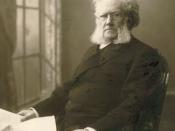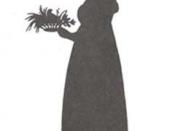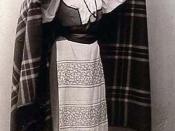Henrik Ibsen's play A Doll House examines a woman's struggle for independence in her marriage and social world. Through the use of character change, Ibsen conveys his theme that by breaking away from all social expectations, we can be true to ourselves. When Ibsen presents Nora Helmer, we see a "perfect" wife, who lives in a "perfect" house with a "perfect" husband and children. The Helmer children have a nanny that raises them. By having the nanny, Nora has the freedom to come and go as she pleases. Torvald Helmer, Nora's husband, will begin a new job as bank manager, so they will be rich, which will make her "perfect" life even better. Torvald even calls Nora pet names like "my sweet little lark" (Ibsen 1567) and "my squirrel" (Ibsen 1565). These names may seem to be harmless and cute little nicknames, but the names actually show how little he thinks of her.
"Torvald uses derogatory diminutives to address Nora" (Kashdan 52). Torvald talks down to her. Nora is "regarded as property rather than a partner" (Drama for Students 112). He isn't treating her like a real person. In Torvald eyes, she isn't an equal. "Nora is viewed as an object, a toy, a child, but never an equal" (Drama for Students 109). Nora and Torvald seem to be in love with each other though. However, Torvald is very controlling of Nora. Torvald makes little rules for Nora to follow. During the time period when the play was written, a husband controlling his wife and making rules for her was not uncommon. One incident of control is when Nora comes home from Christmas shopping. Torvald knows how much Nora loves macaroons and suspects she has bought some to eat. He comments to Nora, "My sweet tooth really didn't...



Break down thoughts
this is really good, but it lacks structure.
0 out of 0 people found this comment useful.